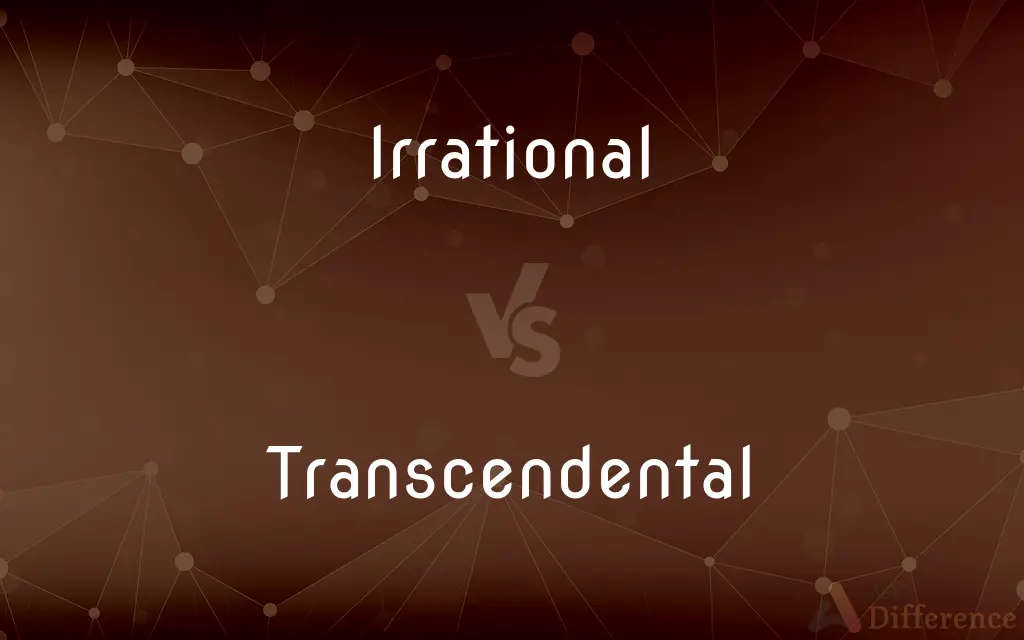Irrational vs. Transcendental — What's the Difference?
By Fiza Rafique & Urooj Arif — Updated on March 27, 2024
Irrational numbers cannot be expressed as simple fractions, while transcendental numbers are a subset of irrationals that are not roots of any non-zero polynomial equation with rational coefficients.

Difference Between Irrational and Transcendental
Table of Contents
ADVERTISEMENT
Key Differences
Irrational numbers are real numbers that cannot be written as a simple fraction, meaning their decimal representations are non-repeating and non-terminating. Examples include √2 and π (pi). These numbers contrast with rational numbers, which can be expressed as fractions made of integers. On the other hand, transcendental numbers are a specific type of irrational number that go a step further; they are not only non-repeating and non-terminating but also cannot be the solution to any polynomial equation with rational coefficients. This makes transcendental numbers like π and e (Euler's number) particularly unique in mathematics.
While all transcendental numbers are irrational, not all irrational numbers are transcendental. For example, the square root of 2 is irrational because it cannot be precisely expressed as a fraction of two integers. However, it is not transcendental because it is the root of the polynomial equation x^2 - 2 = 0, which has rational coefficients. This highlights a key distinction: transcendental numbers' inexpressibility extends beyond the inability to be fractioned into their fundamental non-algebraic nature.
The concept of transcendental numbers introduces complexity to mathematical theory, especially in areas concerning the nature of numbers and their properties. While irrational numbers already challenge our intuitive understanding of quantity by being indefinable in fractional terms, transcendental numbers add another layer by existing outside the scope of algebraic equations. This makes them crucial in discussions about the foundations of mathematics and in proving the existence of numbers with particular properties.
Both irrational and transcendental numbers play significant roles in various branches of mathematics, including calculus, number theory, and geometry. Irrational numbers fill in the "gaps" on the real number line between rational numbers, ensuring that every point on the line corresponds to a real number. Transcendental numbers, by virtue of their definition, highlight the complexity and vastness of real numbers, indicating that numbers can exist that are not solutions to any polynomial equation with rational coefficients.
The discovery and acceptance of irrational and transcendental numbers were pivotal in the development of mathematics, shifting the perspective from a discipline focused on the arithmetic and geometric manipulation of rational numbers to one that acknowledges a more complex number system. The realization that equations could have solutions that were not rational or even algebraic was instrumental in the evolution of mathematical analysis and theory.
ADVERTISEMENT
Comparison Chart
Definition
Numbers that cannot be expressed as a fraction of two integers.
Irrational numbers that are not roots of any polynomial equation with rational coefficients.
Examples
√2, the square root of 3
π (Pi), e (Euler's number)
Characteristics
Non-repeating, non-terminating decimals.
Non-algebraic, cannot be solved in polynomial equations with rational coefficients.
Relation
A broader category of real numbers.
A specific subset of irrational numbers.
Mathematical Significance
Fill the "gaps" between rational numbers on the real number line.
Demonstrate the existence of numbers beyond algebraic constraints.
Compare with Definitions
Irrational
Include roots of certain equations that are not solvable in rationals.
The equation x^2 - 2 = 0 yields an irrational solution.
Transcendental
A type of irrational number not rootable in polynomial equations with rational coefficients.
Pi (π) is a well-known transcendental number.
Irrational
Numbers that cannot be exactly expressed as a fraction.
The square root of 2 is an irrational number.
Transcendental
Found in advanced mathematical concepts.
Transcendental numbers are crucial in understanding the limits of algebraic numbers.
Irrational
Can be found in geometry and algebra.
The diagonal of a square is often an irrational length.
Transcendental
Cannot be algebraically constructed.
Transcendental numbers, like e, are beyond algebraic computation.
Irrational
Characterized by non-repeating, non-terminating decimals.
Irrational numbers like √2 have decimals that go on forever without repeating.
Transcendental
Have unique properties in number theory.
The transcendental nature of e has implications in calculus and exponential functions.
Irrational
Make up a significant part of the real number system.
Irrational numbers are found between rational numbers on the number line.
Transcendental
Include numbers fundamental to mathematics and physics.
The number π is transcendental, integral to circles' geometry.
Irrational
Not endowed with reason.
Transcendental
Concerned with the a priori or intuitive basis of knowledge as independent of experience.
Irrational
Affected by loss of usual or normal mental clarity; incoherent, as from shock.
Transcendental
Asserting a fundamental irrationality or supernatural element in experience.
Irrational
Marked by a lack of accord with reason or sound judgment
An irrational dislike.
Transcendental
Surpassing all others; superior.
Irrational
Being a syllable in Greek and Latin prosody whose length does not fit the metric pattern.
Transcendental
Beyond common thought or experience; mystical or supernatural.
Irrational
Being a metric foot containing such a syllable.
Transcendental
(Mathematics) Of or relating to a real or complex number that is not the root of any polynomial that has positive degree and rational coefficients.
Irrational
(Mathematics) Of or relating to an irrational number.
Transcendental
(obsolete) A transcendentalist.
Irrational
An irrational number.
Transcendental
Any one of the three transcendental properties of being: truth, beauty or goodness, which respectively are the ideals of science, art and religion and the principal subjects of the study of logic, aesthetics and ethics.
Irrational
Not rational; unfounded or nonsensical.
An irrational decision
Transcendental
(philosophy) Concerned with the a priori or intuitive basis of knowledge, independent of experience.
Irrational
Of a real number, that cannot be written as the ratio of two integers.
The number π is irrational.
Transcendental
Superior; surpassing all others; extraordinary; transcendent.
Irrational
A real number that can not be expressed as the quotient of two integers, an irrational number.
Transcendental
Mystical or supernatural.
Irrational
Not rational; void of reason or understanding; as, brutes are irrational animals.
Transcendental
Not algebraic (i.e., not the root of any polynomial that has positive degree and rational coefficients).
Irrational
Not according to reason; having no rational basis; clearly contrary to reason; easily disproved by reasoning; absurd; - of assertions and beliefs.
It seemed utterly irrational any longer to maintain it.
Transcendental
That contains elements that are not algebraic.
Irrational
Not capable of being exactly expressed by an integral number, nor by a ratio of integral numbers; surd; - said especially of roots. See Surd.
Transcendental
Supereminent; surpassing others; as, transcendental being or qualities.
Irrational
Not consistent with or using reason;
Irrational fears
Irrational animals
Transcendental
In the Kantian system, of or pertaining to that which can be determined a priori in regard to the fundamental principles of all human knowledge. What is transcendental, therefore, transcends empiricism; but is does not transcend all human knowledge, or become transcendent. It simply signifies the a priori or necessary conditions of experience which, though affording the conditions of experience, transcend the sphere of that contingent knowledge which is acquired by experience.
Irrational
Real but not expressible as the quotient of two integers;
Irrational numbers
Transcendental
Vaguely and ambitiously extravagant in speculation, imagery, or diction.
Transcendental
A transcendentalist.
Transcendental
Existing outside of or not in accordance with nature;
Find transcendental motives for sublunary action
Transcendental
Of or characteristic of a system of philosophy emphasizing the intuitive and spiritual about the empirical and material
Common Curiosities
What is the significance of irrational numbers in geometry?
Irrational numbers often represent lengths, areas, and volumes that cannot be precisely measured with rational numbers, enriching geometric understanding.
How do irrational numbers differ from rational numbers in their decimal representations?
Irrational numbers have non-repeating, non-terminating decimal expansions, unlike rational numbers, which either terminate or repeat.
What role do transcendental numbers play in calculus?
Transcendental numbers like e and π are fundamental in defining exponential functions, limits, and integrals.
What defines an irrational number?
An irrational number is defined as a real number that cannot be expressed as a simple fraction of two integers.
Can transcendental numbers be calculated?
While exact values of transcendental numbers cannot be fully calculated due to their non-terminating nature, approximations can be used in computations.
How are irrational and transcendental numbers used in mathematics?
They are used to understand the real number line's structure, in calculus, number theory, and various mathematical models.
Why are transcendental numbers important in number theory?
They demonstrate that not all numbers can be derived from algebraic equations, expanding the scope of number theory.
What makes a number transcendental?
A number is transcendental if it is not a solution to any polynomial equation with rational coefficients.
Are all irrational numbers transcendental?
No, not all irrational numbers are transcendental; transcendental numbers form a specific subset of irrational numbers.
Are there any practical applications of transcendental numbers?
Yes, transcendental numbers are used in physics, engineering, and cryptography, among other fields, for modeling phenomena and securing data.
Share Your Discovery

Previous Comparison
Naturist vs. Textile
Next Comparison
Monastery vs. NunneryAuthor Spotlight
Written by
Fiza RafiqueFiza Rafique is a skilled content writer at AskDifference.com, where she meticulously refines and enhances written pieces. Drawing from her vast editorial expertise, Fiza ensures clarity, accuracy, and precision in every article. Passionate about language, she continually seeks to elevate the quality of content for readers worldwide.
Co-written by
Urooj ArifUrooj is a skilled content writer at Ask Difference, known for her exceptional ability to simplify complex topics into engaging and informative content. With a passion for research and a flair for clear, concise writing, she consistently delivers articles that resonate with our diverse audience.















































